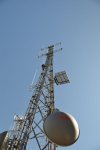"You simply don't know what the hell you're talking about" My, that's kind of harsh since you don't know me or what I do....
I always preach its basically impossible to protect your home antennas from a direct lightning hit, probably never gonna happen But for commercial radio/repeater/satellite installations many survive directs hits all the time with no damage except for the antenna itself. They are designed specifically for that with massive grounding systems.
The buildings I service repeaters in for others and that I have had my commercial repeaters in have survived many direct hits with only the antenna being blown up. I've replaced a number of antennas but none of the equipment or infrastructure was damaged. I've worked in many of the major 5,000ft mountain top repeaters in So Cal like Mt Wilson, Mt Lukens, Santiago Peak, Seirra Peak, Box Springs, smaller ones like Palos Verdes and in Santa Barbra, Gibraltar Peak and Broadcast Peak plus Cheyenne Mt above NORAD in Colorado Springs at 11,500ft, Clarke Mountain at the CA/NV border and bunch of others I forget.
You might not have a clue about these sites (the So Cali guys and girls will) but I've done mountain top repeater and tower work for the last 40+ yrs and have seen a bunch of lightning damage. I was also responsible for design and installation of many multi million $$ satellite uplink systems that require the very best practice grounding techniques to protect the huge $$ investment. None have ever failed due to lightning strikes.
Here is a pic of me several years ago climbing up to inspect a US Coast Guard antenna that was blown to bits by a direct hit, but the repeater and everything else in the building was humming along just fine. This was the second antenna blown up in just a couple of years on this repeater and we replaced the Station Master with a Sinclair dipole array and no problems so far. It may have been hit again but its working fine.
Just because you or your friends sites have not survived a direct hit doesn't mean its not possible because it is and I've seen and experienced it. What's your story Bill?

You're dead-ass wrong. Sorry. Average lightning strike is 300,000,000,000 coulombs of electrons. Think of that as 300 billion watts in a very short time, if you need a mental anchor. Nothing survives a direct hit. Total destruction. Commercial radio/TV stiations spent lots of money to mitigate some damage. But ham radio situations? You simply don't know what the hell you're talking about.


